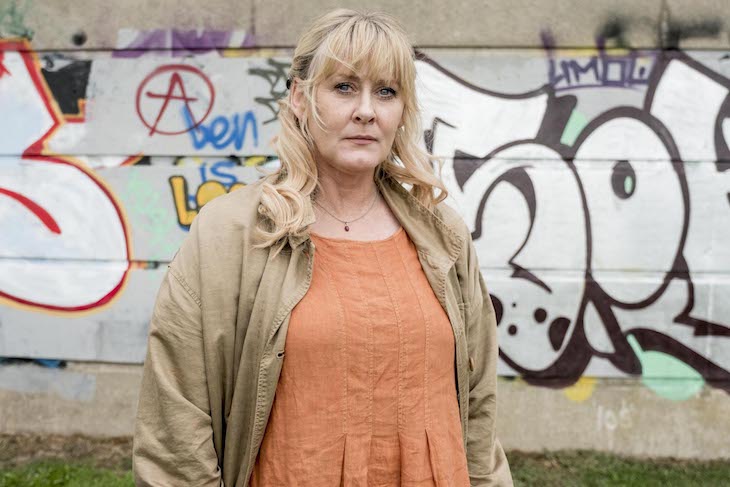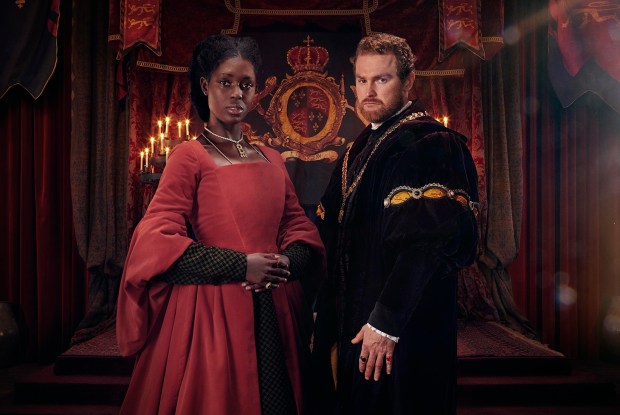These days a genuinely controversial TV drama series would surely be one with an all-white, male-led cast that examined the problems of a bunch of middle-class people. (Just imagine the Twitter outrage!) But while we await that — possibly for a while yet — we’ve now got two highly promising new shows of the more approved ‘controversial’ kind: where racial issues are tackled in a thoughtful and scrupulously responsible way.
Kiri (Channel 4, Wednesday) has the distinct advantage of starring Sarah Lancashire, whose character Miriam proves that TV mavericks needn’t always be doctors, lawyers or cops. They can, it seems, also be social workers. So it was that Miriam was first seen adding something a little stronger to her breakfast coffee. She then headed out into Bristol to show what an all-round good egg she is: delivering a present of sausages to a local crack addict, and telling a teenage boy who’d just broken a girl’s arm that he was really a great kid.
Her next task, though, didn’t go as smoothly. Nine-year-old Kiri was about to be adopted by a middle-class white couple — but before that happened, Miriam thought the girl should be reminded of her roots by paying an unsupervised visit to her black paternal grandparents. (And if you haven’t seen the programme yet, you may want to look away now.) Kiri was then apparently abducted from their house, with her granddad’s connivance, by her birth father, who has convictions for GBH and drug-dealing. Even when the girl’s disappearance made the Six O’Clock News, Miriam still thought everything would end well — which only made Lancashire’s stricken face when the body was discovered all the more wrenching.
Faced with the crisis, her bosses soon snapped into action, denouncing her decision to set up the visit as ‘bold’ and hanging her out to dry. Meanwhile, the newspapers went on the attack with their usual mix of head-shaking sorrow and badly disguised glee, as they accused Miriam of ‘ticking all the leftie boxes’ by putting Kiri’s supposed cultural needs above her safety.
Fortunately, the programme itself is much more nuanced than that, with the ‘issues’ side of things never overshadowing the human story, and the main characters permitted to be a complicated lot. By the end of Wednesday’s episode, in fact, Miriam had turned into something resembling a classic whisky priest: drinking heavily, morally compromised but somehow still appearing to be on the side of the angels.
Jack Thorne’s script also has an obvious sympathy with social workers, whose mistakes may not outnumber other people’s but generally matter far more. Even her boss acknowledged that Miriam’s decisions, however bold, were right 99 per cent of the time — a strike rate most of us would settle for. Luckily, I’m pretty confident I’ll increase mine by suggesting that Kiri will be among the TV highlights of the winter. (Luckily, too, if I’m wrong, my error probably won’t be on the evening news.)
And the same could well apply to ITV’s Next of Kin. This began on Monday with Mona Harcourt, a saintly doctor, looking forward to the return of her brother, a saintly doctor, who’d been running a medical charity in Pakistan. To welcome him back, Mona laid on a surprise party with her extended family, who took a bit of untangling but duly turned out to be a careful cross-section of British Muslims, from a traditional matriarch to a mini-skirted lesbian sister.
But when Mona’s somewhat underwritten husband (Jack Davenport as the male version of all those sweetly supportive TV wives we used to get) opened the front door and the family leapt up to shout ‘Surprise!’, the person they greeted wasn’t Kareem. Instead, it was a policemen bringing news of what we already knew from the first of the episode’s memorably powerful scenes: Kareem had been kidnapped by jihadi fighters on the way to Lahore airport. Not only that, but the policeman also seemed interested in talking to Kareem’s absent son Danny in connection with a recent bomb in London — a bomb that had increased the sense of Islamophobia felt by that lovely grandmother in particular. And from there, Archie Panjabi’s terrific central performance perfectly captured both Mona’s confidence in her family’s status as fully accepted Brits and the effort that she sometimes had to make to retain it.
But if I’m making it sound as if the programme is simply doing some box-ticking of its own, then that wouldn’t fair. Or not entirely. Again, the idea that most Muslims are very nice, and that it’s a shame about the few who aren’t, can’t be called terrifyingly controversial. Yet, Next of Kin shows every sign not merely of shaping it into a proper thriller, but also of allowing it to emerge from a thoroughly imagined family story, rather than imposing it on one.
Got something to add? Join the discussion and comment below.
Get 10 issues for just $10
Subscribe to The Spectator Australia today for the next 10 magazine issues, plus full online access, for just $10.
You might disagree with half of it, but you’ll enjoy reading all of it. Try your first month for free, then just $2 a week for the remainder of your first year.














Comments
Don't miss out
Join the conversation with other Spectator Australia readers. Subscribe to leave a comment.
SUBSCRIBEAlready a subscriber? Log in